英语发音训练
英语音标发音练习(完整版)
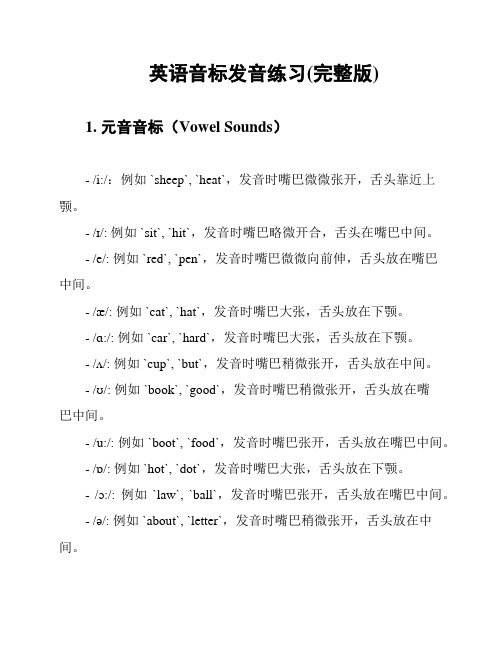
英语音标发音练习(完整版)1. 元音音标(Vowel Sounds)- /i:/:例如 `sheep`, `heat`,发音时嘴巴微微张开,舌头靠近上颚。
- /ɪ/: 例如 `sit`, `hit`,发音时嘴巴略微开合,舌头在嘴巴中间。
- /e/: 例如 `red`, `pen`,发音时嘴巴微微向前伸,舌头放在嘴巴中间。
- /æ/: 例如 `cat`, `hat`,发音时嘴巴大张,舌头放在下颚。
- /ɑ:/: 例如 `car`, `hard`,发音时嘴巴大张,舌头放在下颚。
- /ʌ/: 例如 `cup`, `but`,发音时嘴巴稍微张开,舌头放在中间。
- /ʊ/: 例如 `book`, `good`,发音时嘴巴稍微张开,舌头放在嘴巴中间。
- /u:/: 例如 `boot`, `food`,发音时嘴巴张开,舌头放在嘴巴中间。
- /ɒ/: 例如 `hot`, `dot`,发音时嘴巴大张,舌头放在下颚。
- /ɔ:/: 例如`law`, `ball`,发音时嘴巴张开,舌头放在嘴巴中间。
- /ə/: 例如 `about`, `letter`,发音时嘴巴稍微张开,舌头放在中间。
2. 辅音音标(Consonant Sounds)- /p/: 例如 `pen`, `spin`,发音时闭上双唇,突然张开。
- /b/: 例如 `bat`, `rab`,,发音时闭上双唇,用气声带发音。
- /t/: 例如 `top`, `cat`,发音时舌尖触到上牙龈。
- /d/: 例如 `dot`, `bed`,发音时舌尖触到上牙龈,用气声带发音。
- /k/: 例如 `cat`, `back`,发音时背部舌面和悬梁骨接触。
- /g/: 例如 `go`, `big`,发音时背部舌面和悬梁骨接触,用气声带发音。
- /f/: 例如 `finger`, `coffee`,发音时上牙齿底部和下唇接触。
- /v/: 例如 `very`, `move`,发音时上牙齿底部和下唇接触,用气声带发音。
小学英语语音训练——发音口型与语音知识的掌握

小学英语语音训练——发音口型与语音知识的掌握发音是英语学习中非常重要的一环。
良好的发音能够帮助我们更好地理解和学习语音知识,进而更快地提高英语水平。
而小学阶段正是英语语音训练的重要时期,因此,如何正确地进行发音口型训练及语音知识的掌握是非常值得关注的。
一、发音口型训练1.嘴唇的形状正确发音时,嘴唇的形状是很关键的。
例如,要发 /p/ 音时,我们需要将嘴唇紧闭,然后突然松开发出声音。
而发 /f/ 音则需要将嘴唇轻轻咬合,形成小缝,并且呼气时发出声音。
这样,就可以轻松地发出这两个音。
2.牙齿的紧密程度在发音中,有些音需要将牙齿紧密接触,如 /s/、/z/、/t/、/d/ 等,并且在发出声音时需要让气流从牙缝中通过。
而有些音则需要离开牙齿,如/f/、/v/ 等,在发出声音时需要让气流从牙齿前部通过。
因此,在发音练习中,注意牢记不同音需要牙齿的不同使用方法。
3.舌头的位置舌头的位置也是影响发音的重要因素之一。
例如,发/th/ 音时,需要将舌尖轻轻向上靠近上齿龈。
而发 /k/ 音时,我们需要将舌头抬高,接近上颚,形成一个夹角,并在呼气时产生爆发力,这样才能发出清晰的语音。
因此,小学阶段的英语语音训练中,也要重点注意舌头的位置。
4.气流的掌握气流的掌握也是发音中非常关键的因素。
发音时,我们需要准确控制气流的流量和速度,才能发出标准音。
例如,在发 /sh/ 音时,我们需要用强大的气流和细小的口孔来产生这个音。
而在发/h/ 音时,则需要由呼出的肺气流产生音响。
因此,在发音训练中,也要注意气流的不同使用方式。
二、语音知识的掌握1.辅音和元音的学习在英语语音中,辅音和元音的使用频率很高,因此对小学生来说,熟练掌握辅音和元音的读音是非常必要的。
例如, /b/、/p/、/t/、/d/、/k/、/g/ 等辅音在英语中的使用频率很高。
而/a/、/e/、/i/、/o/、/u/ 等元音则更是不可或缺的基础。
2.连读和重音的理解连读和重音是英语语音中比较难掌握的部分,但是在语音交流中却很重要。
四年级英语 语音发音训练,带答案

C. wash
答案:B 解析:略
14. 选出每一组中"a"发音不同的单词 A. carrots B. apple C. potatoes
答案:C 解析:carrots与apple中a的发音是[æ],potatoes中a的发音是[eɪ]。故选C。
https:///tr/questionPrint?ids=1964633,1536875,1980370,1931756,1964632,1964635,2053207,1948120,2008930,1961956,… 3/14
2020/9/30
掌门教育
1. 找出每组单词中划线部分发音与所给音标读音相同的一项。 /i/ A. this
B. like
C. kite
答案:A 解析:like与kite划线部分的发音都是/aɪ/,this线部分的发音是/i/。故选A。
2. 选出划线部分读音不同的单词 A. red
B. bed
32. 选出发音不同的一项 A. short
B. world
C. work
答案:A 解析:考查字⺟组合发音。字⺟组合"or"在单词"short"中发[ɔ:],字⺟组合"or"在单词"world"中发[ɜ:],字⺟组
合"or"在单词"work"中发[ɜ:],A选项与B选项,C选项,划线部分,发音不同。故选:A。
26. 选出画线部分发音为/e/的单词 A. delicious
B. because
C. welcome
答案:C 解析:略
27. 选出画线部分发音不同的一项 A. help
有效训练英语口语发音的方法与技巧

有效训练英语口语发音的方法与技巧英语口语发音是学习英语的重要一环,准确的发音能够帮助我们更好地与他人交流,提高听力理解能力。
然而,由于英语与汉语的发音规则存在差异,很多学习者在口语发音上遇到了困难。
本文将介绍一些有效的方法和技巧,帮助大家提高英语口语发音。
一、了解国际音标国际音标是一种用符号表示语音的系统,通过学习国际音标,我们可以准确地了解每个音素的发音方式。
掌握国际音标可以帮助我们正确地发音,避免因为母语的干扰而产生错误的发音习惯。
二、模仿母语为英语的人士模仿是学习语言的有效方法之一。
我们可以选择一些母语为英语的人士,如英语教师、英语母语国家的朋友等,通过模仿他们的口音和语调来提高自己的口语发音。
可以通过听他们的录音、观看英语电影或者参加英语角等方式进行模仿。
三、练习元音和辅音的发音英语中的元音和辅音是口语发音的基础。
我们可以通过大量的练习来熟悉和掌握这些音素的发音方式。
可以选择一些常用的单词或者短语,反复练习它们的发音。
可以通过录音自己的发音并与标准发音进行对比,找出自己的不足之处并加以改进。
四、注意语音连读和重音英语中的语音连读和重音是影响口语流利度和自然度的重要因素。
语音连读是指在连续的语音中,相邻的音素之间发生变化,使得语音流畅自然。
重音是指在一个词或者一个句子中,某个音节发音更强调,更有力。
我们可以通过大量的听力练习来熟悉和掌握语音连读和重音的规律,从而提高口语的流利度和自然度。
五、利用语音纠错软件现在有很多语音纠错软件可以帮助我们纠正口语发音中的错误。
这些软件可以通过录音和分析来检测我们的发音是否准确,并给出相应的建议和纠正。
我们可以利用这些软件进行自我练习,不断改进自己的发音。
六、参加口语培训班或者找个口语伙伴参加口语培训班或者找个口语伙伴一起练习口语发音也是一个不错的选择。
在培训班中,我们可以通过专业的指导和集体练习来提高口语发音。
找个口语伙伴可以互相纠正发音错误,进行口语对话练习,相互促进口语发音的提高。
26个字母发音练习

练习方法
模仿发音:模仿标准发音,注意口型和音调 反复练习:多读多练,加深记忆 录音自我评估:将自己的发音录下来,与标准发音对比,找出不足 练习绕口令:通过练习绕口令,提高发音准确性和流畅性
02
B的发音
字母B的发音
音标:/bɪ/ 发音方法:双唇紧闭,气流经口腔爆破而出,声带振动 发音例词:big /bɪɡ/、black /blæk/、blue /bluː/ 发音技巧:注意发音时不要发出声,轻触上齿龈,略感震动即可
练习方法
模仿发音:听录音或看视频,模仿标准发音 反复练习:多读含有字母“F”的单词和句子,加强记忆 对比纠正:将自己的发音与标准发音对比,找出不足并纠正 创造语境:将字母“F”融入日常对话中,提高实际应用能力
07
G的发音
字母G的发音
音标发音:音标/dʒiː/,类似于汉语拼音中的“ji” 发音技巧:舌后部抬高,靠近软腭,形成阻塞,气流从舌两边流出 常见单词:例如“girl”、“give”、“go”等 发音注意事项:注意不要发成汉语拼音中的“ge”,也不要发成汉语拼音中的“ji”
YOUR LOGO
20XX.XX.XX
26个字母发音练习
,a click to unlimited possibilities
汇报人:
目 录
01 A 的 发 音 02 B 的 发 音 03 C 的 发 音 04 D 的 发 音 05 E 的 发 音 06 F 的 发 音
01
A的发音
字母A的发音
练习方法
模仿发音:仔细听并模仿标准的C 发音
对比练习:将C与其他相近发音的 字母进行对比练习
添加标题
添加标题
添加标题
添加标题
反复练习:多次重复C的发音,直 到熟练掌握
英语发音训练补充训练
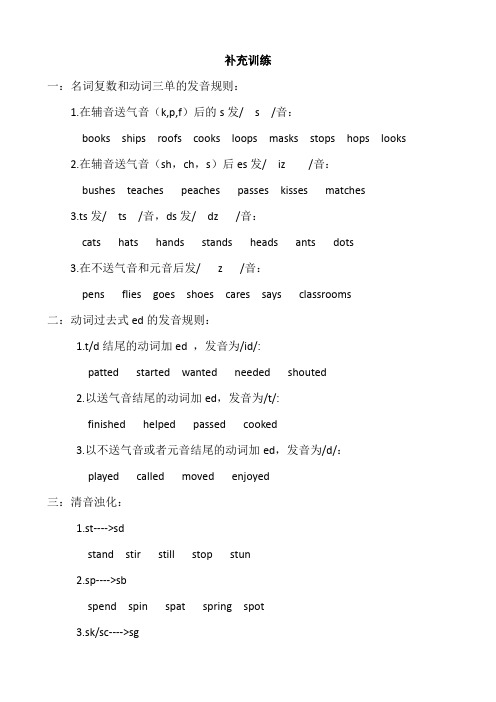
补充训练一:名词复数和动词三单的发音规则:1.在辅音送气音(k,p,f)后的s发/ s /音:books ships roofs cooks loops masks stops hops looks2.在辅音送气音(sh,ch,s)后es发/ iz /音:bushes teaches peaches passes kisses matches3.ts发/ ts /音,ds发/ dz /音:cats hats hands stands heads ants dots3.在不送气音和元音后发/ z /音:pens flies goes shoes cares says classrooms二:动词过去式ed的发音规则:1.t/d结尾的动词加ed ,发音为/id/:patted started wanted needed shouted2.以送气音结尾的动词加ed,发音为/t/:finished helped passed cooked3.以不送气音或者元音结尾的动词加ed,发音为/d/:played called moved enjoyed三:清音浊化:1.st---->sdstand stir still stop stun2.sp---->sbspend spin spat spring spot3.sk/sc---->sgskate score skin skull sky4.str---->sdrstreet strap string struck strong 四:常见的连读,弱读和爆破:1.I want to go to the party.2.Can you stop patting at my arm?3.I am angry at him.4.I have a lot of friends.5.She reads a lot of books when she is alone.6.Can you read the book to me ?7.Do you love to swim in the river in summer?8.It’s nice to see you again.五、试着拼读以下单词:。
英语口语发音十大技巧

英语口语发音十大技巧
英语口语发音是学习英语的重要部分,下面我将分享十大技巧
来帮助你提高英语口语发音:
1. 学习国际音标,掌握国际音标可以帮助你准确地理解和发音
英语单词,这是建立良好发音基础的关键。
2. 听力训练,多听英语,尤其是母语为英语的人说话,模仿他
们的发音,这有助于提高你的口语表达和发音准确性。
3. 练习元音和辅音,元音和辅音是构成英语发音的基本要素,
熟练掌握它们的发音规律对提高口语发音非常重要。
4. 练习舌尖音和舌面音,英语中有一些特殊的舌尖音和舌面音,比如 "th"、"r" 等,需要通过反复练习来掌握。
5. 注重连读和重音,英语中的连读和重音对于句子的自然流畅
非常重要,学会正确的连读和重音可以提高口语表达的地道性。
6. 利用语音学习工具,现在有很多语音学习App和网站可以帮
助你练习发音,比如语音识别软件和在线发音练习课程。
7. 参加口语班或找外教辅导,参加专业的口语班或找外教辅导可以帮助你及时纠正发音错误,提高口语水平。
8. 反复练习,学习任何技能都需要反复练习,口语发音也不例外,坚持不懈地练习是提高口语发音的关键。
9. 注重语调和语音语调是英语口语的重要组成部分,学会模仿英语的语音语调可以让你的口语更加地道。
10. 自信和勇于开口,最后,要克服害羞和紧张心理,勇于开口练习,相信自己的发音会越来越好。
希望以上这些技巧能够帮助你提高英语口语发音水平。
记住,掌握好的发音需要时间和耐心,持之以恒,你一定会取得进步的。
怎么练习英语发音-英语发音怎么练

怎么练习英语发音-英语发音怎么练学习英语发音,要像学习越南语一样,从一个字母开始,然后是押韵,然后形成一个完整的单词。
因此,关于英语来说,要想学习英语发音,还必须要从最小的英语音节开始。
1.从最小的单词单元开始学习就像学习越南语一样,从一个字母开始,然后是押韵,然后形成一个完整的单词。
因此,关于英语来说,要想学习英语发音,你还必须要从最小的英语音节开始。
让我们从流畅,准确地学习英语字母开始。
在了解了字母以及如何阅读之后,你将开始听英语。
英语与越南语不同,英语的发音和声音也有很大差异,因此这是保证学习和学习时准确无误的重要步骤。
2.知道英语的发音国际语音表是由语言学家创建和使用的语音符号系统,用于正确和分别地代表所有人类语言的音节。
它是由国际语音协会开发的,旨在成为世界上所有语言的语音标准。
因此,也要善于发音,也要学会发音和英语语音图表!3.选择正确的发音课程英语发音学习词典非常现代。
没有厚厚的词典,像旧词典一样充满了单词。
词典现在具有集成的词汇发音功能。
因此,每次学习一个新单词时,你都应该学习如何转录,学习阅读并尝试模仿母语人士的阅读。
在选择字典来学习发音时,尝试寻找高可靠性的来源,因为可能有些字典的内容仍然有错误,这可能会对你的学习产生不利影响。
2如何学习英语发音一、模仿英语读音模仿是一种最原始的学习方法,关于〔英语口语〕读音这种必须要施行的语言技能来说,模仿的学习方法会更加直接有效。
同学可以选择一套正宗纯正的英语口语教材进行学习,最初要依据外国人纯正的发音进行学习,从而避免音调上的走形。
另外也可以选择有外教师资的课外辅导机构,在外教身上感受纯正的发音,进行模仿学习,让英语本土的老师来改正自己的读音,增加互动交流,可以事半功倍。
二、改正英语读音因为我们的同学没有一个优良的学习英语的语言环境,所以,在英语读音的学习中不免会出现发音不准的问题,一般的英语老师只注重单词和语法的应试教育,不够重视口语发音上的问题。
三年级英语基本功训练上册

三年级英语基本功训练上册一、发音训练:1. 启蒙训练1) 听录音,试着配上国际音标:[kʌri] [hɪ] [bɑ:n] [fei] [gɔd] [ti:]2) 听录音,试着学习26个字母的正确发音: [eɪ] [bi:] [si:] [di:] [ɪf] [ti:] 2. 复习课文1) 复习已经学习过的单词,试着学习它们的发音:[mɔ:tə] [fɔt] [skʌl] [skʌl] [frend]2) 复习已经学习过的句子,把句子发音准确:I'm [ɑ:i] Tom.He is [hi:z] my friend.What's [wɔ:ts] your name?二、词汇训练:1.启蒙训练1) 以词形复现来训练单词,把下列单词进行认读:dog cat pan cup book2)以单词复现来训练单词,把下列单词进行认读:jump play run stand go2. 复习课文1)以词形答题来检测对背诵课文的掌握程度: His name is Paul. He is my friend.2)以句子复现训练单词,把下列句子读出来:I have a cat. It's blackand white.三、语法训练:1.启蒙训练1)以单词练习动词的变化:play-played, run-ran, go-went2)以句子练习动词的变化:He plays basketball. He played basketball yesterday.2. 复习课文1)以句子练习现在简单式的构成:I like sports. She likes sports.2)以句子练习一般过去时的构成:She went to school. He had lunch in the school.。
音标练习题-发音训练

音标练习题-发音训练一、选择题1. 下列哪个单词中的音标与其他三个单词不同?- A. [pɪt]- B. [bɪg]- C. [tʃɔp]- D. [dʌk]2. 以下哪个单词中的音标与“fun”音标相同?- A. [pʌt]- B. [fʊd]- C. [ʃɪp]- D. [ʌs]3. 在下列四个单词中,哪一个单词的音标与其他三个不同?- A. [təʊ]- B. [aɪ]- C. [i:]- D. [u:z]4. “cat”这个单词的音标与下列哪个单词的音标相同?- A. [peɪt]- B. [kæt]- C. [dɒg]- D. [teίk]5. 下列哪个单词的音标与其他三个不同?- A. [ɔ:ɪ]- B. [əʊ]- C. [aʊ]- D. [ʊə]二、填空题1. 下列四个单词中,与“watch”发音相同的是__________。
2. “sheep”一词与以下哪个单词的音标相同?3. “ship”这个单词中的音标与下列哪个单词相同?4. “now”一词的读音与下列哪个单词相同?5. 下列哪个单词的音标与“home”音标相同?三、连线题请根据单词音标连接相对应的单词:1. [si:]- A. fish2. [bʌs]- B. sheep3. [meɪk]- C. see4. [dɔg]- D. make5. [ɪt]- E. dog四、判断题判断下列单词的音标是否正确,并在括号内标注“对”或“错”。
1. [ədˈvɑ:nst] ( )2. [seɪfeɪl] ( )3. [ˈæpl] ( )4. [səˈbændən] ( )5. [ˈrɪvɚ] ( )五、简答题1. 请解释音标在研究和掌握英语发音中的重要性。
2. 常见的英语音标有哪几种?请列举出来。
3. 解释元音和辅音的区别,并举例说明。
4. 请解释声调在音标中的作用,以及英语中有哪些声调。
5. 如何通过音标来改善英语发音,提高口语水平?以上是关于音标练题和发音训练的文档,希望对您有所帮助!。
小学学习的音标发音练习

小学学习的音标发音练习在小学英语学习的初期,音标发音练习是培养正确发音的重要环节之一。
音标是一种用符号表示语音的系统,可以帮助学生准确地发出不同的英语音素。
以下是一些适合小学生进行音标发音练习的方法和技巧。
一、听力训练听力是英语学习的基础。
在小学阶段,通过音标发音训练可以帮助学生更好地理解和模仿英语的发音。
以下是一些针对小学生的听力训练建议:1. 听录音并跟读:教师可以播放包含不同音标的录音,让学生在听到音标后跟着录音进行模仿发音。
2. 听辨练习:教师可以播放包含相似音素的单词或句子,让学生通过听辨判断出正确的音标发音。
二、口语练习口语练习对于培养准确的音标发音至关重要。
以下是一些适合小学生口语练习的建议:1. 单词朗读:学生可以通过朗读音标标识的单词来练习正确的音标发音。
可以选择一些常用的单词,如动物、水果、家具等,让学生逐个朗读。
2. 句子模仿:教师可以给出一些简单的句子,并要求学生模仿教师的发音进行朗读。
这样能够帮助学生更好地掌握音标发音的语调和节奏。
三、读音练习通过针对不同音标的读音练习,可以帮助学生更好地理解和掌握英语的发音规则。
以下是一些适合小学生的读音练习方法:1. 音标发音配对:教师可以准备一些包含不同音标的单词卡片,让学生根据音标发音将相应的卡片配对。
这样可以训练学生对音标发音的敏感度和准确性。
2. 音标填空练习:教师可以给出一些含有空格的句子,让学生根据所学音标填入正确的发音。
这样可以帮助学生理解音标在不同单词中的变化规律。
四、游戏活动通过游戏的形式,可以增加学生对音标发音练习的兴趣和参与度。
以下是一些适合小学生的音标发音游戏活动:1. 音标接龙:学生们围成一个圈,每人要根据前一个同学说的音标发出一个以该音标开头的单词。
不能重复的人就出局,最后剩下的人获胜。
2. 音标抓字母:在黑板上随机写出一些字母,学生们根据教师给出的音标发音,尽快抓取对应的字母。
抓到正确字母最多的学生获胜。
如何拥有一口流利的英语——发音训练篇

/t/ /ə/
/t/ /ɪt/
辅音+元音连读 = 辅元连读
gotta = gonna
5
形态一:辅元连读
Put it on, please.
/t/ /ɪt/ /ɒn/
辅音 (发音)
元音 (发音)
按声音规律连读
1. I’m an English boy. I’m a n English boy. 2. What about a drink? What about a drink?
1
形态二:辅辅连读
I’m from Macao. 规则一:相同或相似辅
音发音放在一起时,只
/frɑːm/ /məˈkau/ 读后面的音
2
一起练习吧~
Make some money
He keeps silent.
3
Goodbye! 爆破音 (Plosive) Sit down 爆破音? What?
4
6大爆破音
/p/ /b/ /k/ /g/
记忆方法: 【PK 他,不敢打】
/t/ /d/
5
规则二:失去爆破
/p/, /b/, /t/, /d/, /k/, /g/
任意两个爆破音组合 失去前面的爆破音 Goodbye! blackboard A black car sit down black coffee September
•39
1
连读
2
3
缩读 音变
音变 ( 同 化 ) 规则一:/t/+/j/=/tʃ/ How about you? /t/ /j/
Can I get you a drink?
•36
7
音变 ( 同 化 ) 规则二:/d/+/j/=/dʒ/ Could you tell? /d/ /j/
改善英语发音的十个方法

改善英语发⾳的⼗个⽅法 发⾳是可以通过训练来改善的,如何训练更加有效果呢?请看内容。
1. Listen to yourself 如果你听不到⾃⼰的发⾳问题,要纠正就很难了。
试着把你说的话录下来并和为母语⼈⼠说得进⾏对⽐。
2. Slow down 很多英语者常说语速太快容易养成他们的坏习惯。
每天练习⼀些基本语⾔。
从单⾳节开始,然后单词,最后把⼏个词连在⼀起。
3. Picture it 闭上眼睛并在说出⼝之前想⼀想如何发这个⾳。
出⼝型和脸部动作。
4. More practice 每天集中训练⼏个⾳。
你发‘th’的⾳有困难吗?将你的⾆头放在齿间(不要咬住)并从⼝中吐⽓,感受⽓流从你的⾆间流过。
5. Watch yourself 站在镜⼦前看看你发某些固定⾳时的嘴型、唇型和⾆头的位置。
对⽐⼀下,你在Englishtown看到的发⾳录像! 6. Copy the experts 从那些为英语母语⼈⼠的专家那⾥,学习发⾳的⽅式是⽆可取代的好⽅法。
因此仔细听!听英语⼴播节⽬并看英语电视节⽬和电影。
(不要念字幕!)模仿你所听到的`,就算你还不肯定他们说的话。
7. Practice alone。
发⾳的问题迟迟不能解决就是因为我们害怕犯错。
创造⼀些对话情景:⽐如,第⼀次见⾯、在饭店点菜或是询问⽅向,然后让⾃⼰表演出对话内容。
别害羞! 8. Find a language buddy 从旁观者获得反馈是⾮常重要的。
找⼀个对提⾼英语同样感兴趣的朋友。
试着更换录⾳资料,这样你就可以互相听对⽅的发⾳。
9. Be poetic 好的发⾳不仅是掌握单独的⾳节。
还是对intonation(声⾳的升降调)和stress(对单词中⼀些⾳节和句⼦中的⼀些单词更⼤声更清晰地发⾳)的理解。
⼤声念⼀些诗歌、演讲、歌曲,集中练习单词的重⾳和⾳调。
10. Sing a song 学习⼀些英语流⾏歌曲的歌词并跟着唱。
唱歌能帮助你放松并能让你说出这些词来,同时帮助改进你的语⾳和语调。
练好英语发音的技巧

练好英语发音的技巧1.学习音标:英语音标是学习英语发音的基础,熟练地掌握音标能够帮助你正确地发出每个音素。
你可以通过在网上音标表或购买一本英语发音教材来学习音标,并逐个练习。
2.听力训练:从小培养听力对改善发音非常重要。
要提高听力水平,你可以通过听英语广播、音乐、电影和纪录片来锻炼。
此外,使用英语学习应用程序进行听力练习也是一个不错的方法。
3.模仿母语发音:我们可以从模拟母语发音开始。
请注意观察并尝试拾取母语人士说话时的嘴唇、舌头和声带的动作。
通过模仿他们的发音,可以帮助我们更好地理解并学习正确的发音。
4.借助录音设备:找一台录音设备,可以是手机或者电脑,使用它录下你的声音。
一旦录音完成,再与母语人士的发音进行对比,寻找差异,并不断改正自己的发音。
录音也可以帮助你更好地感受到自己的发音和语调。
5.参加发音课程:如果你希望加强发音技巧并获得指导,你可以考虑参加专业的发音课程。
这些课程通常由资深的语言教师或演讲专家领导,能够针对你的个人需求提供指导和反馈。
6.练习发音绕口令:发音绕口令是一种有趣的练习方法,可以帮助你练习特定的音素和刺激口腔肌肉。
找一些有挑战性的绕口令并进行反复练习,对于改善发音非常有效。
7.多读多练:阅读和大声朗读英语文章能够帮助你熟悉并掌握正确的发音。
尽量选择那些包含不同音素和语调的文章,并注意每个音素的发音。
尝试朗读并模仿母语人士的发音,直到你能够准确地复制他们的语音。
8.练习口形和呼吸:发音不仅取决于嘴巴的动作,还与口形和呼吸有关。
练习开口的形状,并注意使用适当的呼吸技巧。
一个良好的呼吸控制可以帮助你更好地运用语音和改善发音。
9.获得反馈:当你练习发音时,寻找一位有经验的英语教师或者以英语为母语的朋友,让他们听你的发音并给予反馈。
他们可以帮助你识别和纠正发音错误,并提供宝贵的建议和指导。
10.练习口头表达:除了发音外,流利和自信的口语表达也是非常重要的。
参加一些英语口语俱乐部或交流班,与其他英语学习者一起练习口头表达,并尝试与他人进行对话,以提高流利度和自信心。
纠正英语发音的方法

纠正英语发音的方法
英语发音是许多学习者所面临的挑战之一。
然而,通过一些简
单的方法和技巧,你可以提高你的英语发音,使之更加清晰和准确。
以下是一些纠正英语发音的方法:
1. 学习国际音标(IPA),国际音标是一种标记语音的符号系统,可以帮助你准确地发音。
通过学习国际音标,你可以更好地理
解每个音素的发音方式,并且更容易纠正发音错误。
2. 练习元音和辅音,英语中的元音和辅音是发音的基础。
练习
这些音素的发音,特别是那些在你的母语中不存在的音素,可以帮
助你改善发音。
3. 听力训练,多听英语,特别是母语为英语的人士的发音。
通
过模仿他们的发音,你可以更好地掌握正确的发音方式。
4. 利用语音识别软件,现代科技的发展使得有许多语音识别软
件可以帮助你纠正发音。
这些软件可以指出你的发音错误,并给出
改进的建议。
5. 寻求帮助,如果你有机会,最好找一个母语为英语的人士帮助你练习发音。
他们可以给你及时的反馈,并纠正你的发音错误。
总之,纠正英语发音需要耐心和练习。
通过学习国际音标,练习元音和辅音,听力训练,利用语音识别软件以及寻求帮助,你可以逐渐提高你的英语发音水平,使之更加地清晰和准确。
字母发音训练
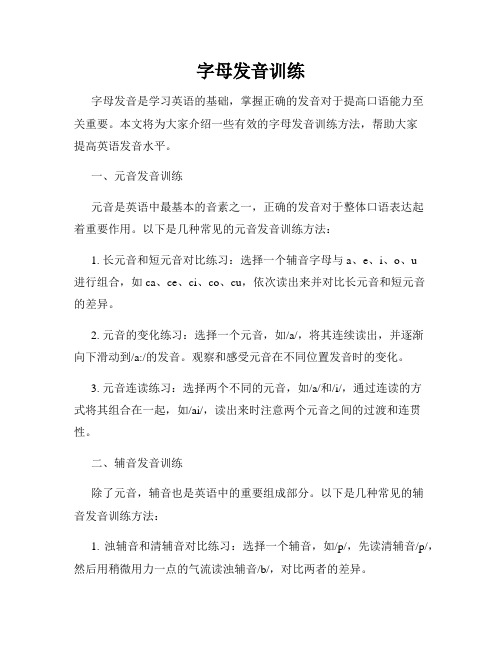
字母发音训练字母发音是学习英语的基础,掌握正确的发音对于提高口语能力至关重要。
本文将为大家介绍一些有效的字母发音训练方法,帮助大家提高英语发音水平。
一、元音发音训练元音是英语中最基本的音素之一,正确的发音对于整体口语表达起着重要作用。
以下是几种常见的元音发音训练方法:1. 长元音和短元音对比练习:选择一个辅音字母与a、e、i、o、u进行组合,如ca、ce、ci、co、cu,依次读出来并对比长元音和短元音的差异。
2. 元音的变化练习:选择一个元音,如/a/,将其连续读出,并逐渐向下滑动到/a:/的发音。
观察和感受元音在不同位置发音时的变化。
3. 元音连读练习:选择两个不同的元音,如/a/和/i/,通过连读的方式将其组合在一起,如/ai/,读出来时注意两个元音之间的过渡和连贯性。
二、辅音发音训练除了元音,辅音也是英语中的重要组成部分。
以下是几种常见的辅音发音训练方法:1. 浊辅音和清辅音对比练习:选择一个辅音,如/p/,先读清辅音/p/,然后用稍微用力一点的气流读浊辅音/b/,对比两者的差异。
2. 单辅音连续发音练习:选择两个不同的辅音,如/s/和/t/,将其连续读出,注意两个辅音之间的过渡和连贯性。
3. 辅音组合练习:选择两个或多个辅音进行组合,如/sp/、/st/、/sk/等,将其读出,并注意辅音之间的准确度和清晰度。
三、音标发音训练音标是用来表示字母和发音之间对应关系的符号系统。
以下是几种常见的音标发音训练方法:1. 学习音标的基本发音:逐个学习音标表中的基本发音,如/i:/、/æ/、/ʒ/等,通过反复朗读和模仿,逐渐提高对音标发音的熟悉度。
2. 音标与词汇对应练习:选择一些常用的单词,通过查阅字典或参考教材,了解其音标,并通过朗读练习将音标和词汇对应起来。
3. 音标的连读练习:选择两个或多个音标进行组合,并通过连读的方式将其读出来,注意音标之间的过渡和连贯性。
四、口语训练除了对发音进行专门的练习之外,还需注重口语训练的整体性。
提高英语发音的个练习方法
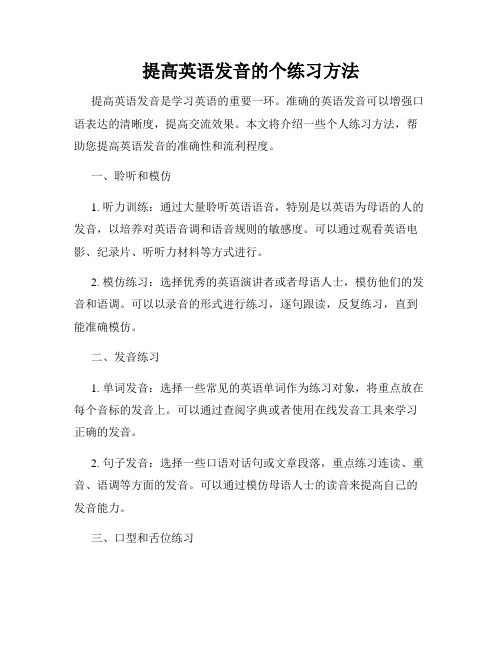
提高英语发音的个练习方法提高英语发音是学习英语的重要一环。
准确的英语发音可以增强口语表达的清晰度,提高交流效果。
本文将介绍一些个人练习方法,帮助您提高英语发音的准确性和流利程度。
一、聆听和模仿1. 听力训练:通过大量聆听英语语音,特别是以英语为母语的人的发音,以培养对英语音调和语音规则的敏感度。
可以通过观看英语电影、纪录片、听听力材料等方式进行。
2. 模仿练习:选择优秀的英语演讲者或者母语人士,模仿他们的发音和语调。
可以以录音的形式进行练习,逐句跟读,反复练习,直到能准确模仿。
二、发音练习1. 单词发音:选择一些常见的英语单词作为练习对象,将重点放在每个音标的发音上。
可以通过查阅字典或者使用在线发音工具来学习正确的发音。
2. 句子发音:选择一些口语对话句或文章段落,重点练习连读、重音、语调等方面的发音。
可以通过模仿母语人士的读音来提高自己的发音能力。
三、口型和舌位练习1. 口型练习:练习英语中特殊音的口型,例如舌尖音、舌面音等。
可以通过在镜子前观察自己的口型,逐渐调整到正确的位置。
2. 舌位练习:练习舌头的位置和运动,特别是涉及到舌尖音、舌面音的发音。
可以通过舌头操练习,如舌头上下、左右、前后移动等。
四、录音和反馈1. 录音练习:使用录音设备或手机录下自己的发音练习。
可以重复录音多次,对比自己的发音与模仿对象的发音差异,发现问题并进行改进。
2. 反馈与纠正:请他人或老师为您的发音进行评估和指导,帮助您发现不准确的发音,并提供纠正的方法和建议。
五、口语训练与实践1. 模拟对话:与他人进行英语口语练习,模拟日常对话场景,使练习更接近实际交流情景。
可以与其他英语学习者一起练习,互相纠正发音错误。
2. 加入口语班或俱乐部:参加英语口语训练班或俱乐部,与志同道合的人一起学习和交流,提高口语表达能力和发音准确性。
六、持之以恒,勤加练习1. 每天坚持:每天设定一定的时间进行发音练习,保持持续性的学习。
即使是短时间的发音练习,也能够积累有效的学习成果。
英语学习技巧练习语音语调的方法

英语学习技巧练习语音语调的方法英语学习技巧:练习语音语调的方法英语学习中,语音语调是非常重要的一部分。
准确的语音语调可以帮助我们更好地表达自己,增强交流的效果。
本文将介绍一些练习语音语调的方法,帮助你提高英语口语表达能力。
一、练习发音1. 学习国际音标:国际音标是学习英语发音的基础。
通过学习国际音标,我们可以准确地掌握每个音素的发音方式,从而提高发音的准确性。
2. 听力训练:多听英语原声,尤其是母语为英语的人的发音。
通过模仿他们的发音,我们可以更好地掌握英语的语音特点。
3. 练习口型:练习正确的口型可以帮助我们更准确地发音。
可以通过跟读英语短文、口语练习等方式来练习口型。
二、练习语调1. 学习重音:英语中的重音对于理解和表达意思非常重要。
学习单词和句子的重音,并注意正确地发音重音部分。
2. 学习语调:英语中的语调对于表达情感和意思的准确性有很大影响。
学习不同语境下的语调,如陈述句、疑问句、感叹句等,可以帮助我们更好地表达自己。
3. 练习口语:通过大量的口语练习,我们可以更好地掌握英语的语音语调。
可以找语伴进行对话练习,或者参加英语角等活动,提高口语表达能力。
三、练习口语流利度1. 多读英语文章:通过大量的阅读,我们可以提高口语的流利度。
可以选择一些适合自己水平的英语文章,进行大声朗读。
2. 练习口语速度:练习口语时,可以逐渐提高自己的口语速度。
可以选择一些短文或口语练习材料,进行快速朗读。
3. 练习口语连贯性:练习口语时,要注意句子之间的连贯性。
可以通过练习口语对话,或者进行自我对话的方式,提高口语的连贯性。
四、练习口音1. 学习地道口音:英语有很多不同的口音,如美式口音、英式口音等。
可以选择一种自己喜欢的口音,通过听力训练和模仿,逐渐掌握地道口音。
2. 练习发音细节:英语中有很多发音的细节,如元音的发音、辅音的发音等。
可以通过练习这些细节,提高口音的准确性。
3. 听力训练:通过多听英语原声,我们可以更好地掌握地道口音。
英语四级口语发音训练

英语四级口语发音训练英语四级口语发音训练对于提高口语能力和自信心非常重要。
良好的发音能够帮助我们更好地与他人交流,并且在口语考试中取得好成绩。
本文将介绍几种有效的发音训练方法,帮助大家提高英语口语发音水平。
一、声母和韵母练习声母和韵母是英语发音的基本要素,正确掌握并运用它们是发音训练的首要任务。
可以通过模仿和练习来提高自己的发音准确性。
在练习声母时,可以选择一些常见的单词,如cat、dog等,并注意吐字清晰;在练习韵母时,可以选择一些含有不同韵母的单词,如meet、mate等,并注意正确发音。
二、单词重音练习英语单词的重音在口语表达中非常重要,它可以帮助我们更好地理解和表达意思。
在练习单词重音时,可以选择一些常用单词,如important、comfortable等,并注意正确强调重音音节。
可以借助录音或音频材料来进行听力训练,提高自己对重音的敏感度。
三、口语语调练习英语口语的语调是区分不同语义和表达特点的重要因素。
在练习口语语调时,可以选择一些短语和句子,并注意正确的语调变化。
可以通过模仿和朗读来提高自己的语调准确性和自然度。
四、连读和弱读练习英语口语中的连读和弱读是使句子流畅和自然的重要手段。
在练习连读和弱读时,可以选择一些常用短语和句子,并注意正确地运用连读和弱读规则。
可以借助录音或音频材料来进行听力训练,提高自己对连读和弱读的理解和应用能力。
五、口语正音训练通过参加正音班或雇佣外教进行正音训练,可以更快更好地提高口语发音水平。
正音班通常会有专业的发音指导和个性化训练,可以帮助学员分析个人问题并提供有效的解决方案。
雇佣外教可以提供更贴身化的一对一教学,帮助改正个人发音错误并强化正确发音的记忆。
总结起来,英语四级口语发音训练是提高口语能力的关键环节。
通过声母和韵母的练习、单词重音的强调、口语语调的模仿、连读和弱读的应用以及口语正音训练,我们可以有效提高自己的发音准确性和流利度。
希望以上方法能对大家的英语口语发音训练有所帮助,祝大家取得好成绩!。
g的发音训练方法
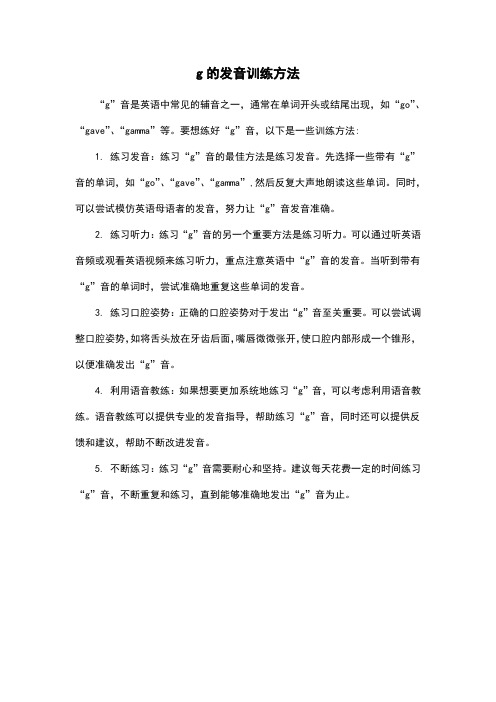
g的发音训练方法
“g”音是英语中常见的辅音之一,通常在单词开头或结尾出现,如“go”、“gave”、“gamma”等。
要想练好“g”音,以下是一些训练方法:
1. 练习发音:练习“g”音的最佳方法是练习发音。
先选择一些带有“g”音的单词,如“go”、“gave”、“gamma”,然后反复大声地朗读这些单词。
同时,可以尝试模仿英语母语者的发音,努力让“g”音发音准确。
2. 练习听力:练习“g”音的另一个重要方法是练习听力。
可以通过听英语音频或观看英语视频来练习听力,重点注意英语中“g”音的发音。
当听到带有“g”音的单词时,尝试准确地重复这些单词的发音。
3. 练习口腔姿势:正确的口腔姿势对于发出“g”音至关重要。
可以尝试调整口腔姿势,如将舌头放在牙齿后面,嘴唇微微张开,使口腔内部形成一个锥形,以便准确发出“g”音。
4. 利用语音教练:如果想要更加系统地练习“g”音,可以考虑利用语音教练。
语音教练可以提供专业的发音指导,帮助练习“g”音,同时还可以提供反馈和建议,帮助不断改进发音。
5. 不断练习:练习“g”音需要耐心和坚持。
建议每天花费一定的时间练习“g”音,不断重复和练习,直到能够准确地发出“g”音为止。
- 1、下载文档前请自行甄别文档内容的完整性,平台不提供额外的编辑、内容补充、找答案等附加服务。
- 2、"仅部分预览"的文档,不可在线预览部分如存在完整性等问题,可反馈申请退款(可完整预览的文档不适用该条件!)。
- 3、如文档侵犯您的权益,请联系客服反馈,我们会尽快为您处理(人工客服工作时间:9:00-18:30)。
Introduction to Phonetics I
Fall 2012 Instructor: Karen Steffen Chung 史嘉琳 Associate Professor, Department of Foreign Languages and Literatures National Taiwan University Unless noted, the course materials are licensed under Creative Commons Attribution-NonCommercial-ShareAlike 3.0 Taiwan (CC BY-NC-SA 3.0)
2
Sep.oom doors will be closed and locked at 8:20. Cell phones must be turned off during class. What you will need: i. Textbook: Available at Crane's 文鶴 (金山南路二段 200 號 8 樓). Ladefoged, Peter & Keith Johnson. 2011. A Course in Phonetics. 6th ed. International Student Edition. Boston: Wadsworth Cengage Learning. 322pp. Paper; includes CD-ROM. Make sure you have a textbook by Wednesday, September 12. ii. Notebook: Class notes will be handed in every Monday in single sheets. You are expected to take notes not only on the contents of the textbook and supplements, but also on the pronunciation corrections you and other students receive when reading aloud in class. Tracking your mistakes will help you identify which areas you need to work on! iii. Other things: - A plastic pocket or a pocket folder to save everything - A plan from YOU to improve your pronunciation - A computer with a headset with a microphone (for recording assignments) and Internet access For more information about tools for taking notes please see the course webpage .tw/~karchung/phon1intro1F12.htm * Why is correct pronunciation important? - Native speakers will feel tired if they have to constantly listen to wrong pronunciations (especially incorrectly stressed words) or a strong accent. The next time they meet you, they may not be as anxious to speak with you. Loss of patience from the listeners Loss of power to you - Correct pronunciation is: Listener-friendly (though tolerating different accents is still necessary!) E.g. A Taiwanese student’s pronunciation of “TV games” was unintelligible to the instructor in class, and on a later occasion to all of the native speakers of English attending an international conference. 3. Introduction to the areas of linguistics and phonetics a. Visit the webpage of UCL (University College London) to learn about major branches of linguistics and to know what phonetics is. /entrance/introduction.php#Linguistics
1
Sep. 10, 2012
* In which part of the United States do we find the greatest dialectal variation? - New England and the East Coast in general, e.g. New Jersey, Boston, etc. - The South, starting from Maryland in the East, to Florida in the South, to Texas in the West. * What is “Standard American English”? - People with a different accent in American English will often “code-switch” when talking to people from other parts of the country or from other countries for more efficient communication. The speech style they use will often be some variation of “General American”. * Estuary English: - Popular teenage English spoken in the southeast part of the United Kingdom. More and more adults over 30 or even 40 years olds are using this dialect of British English. E.g. three: Standard Southern British English interdental [θ]: [θri] vs. Estuary labiodental [f]: [fri]; SSB building ['bɪldɪŋ]; Estuary: ['biudɪŋ] For more details, please visit the course website .tw/~karchung/phon1intro1F12.htm c. Grading: Pronunciation journals: take notes on all pronunciation corrections, class notes, and occasional notes on your observations of language in use E.g. How people talk to younger children: 小車車 is used to refer to toy cars; no tone change when reduplicated; But with other words, especially familial relationships, a third plus a second tone are often used in “baby talk” or to show intimacy in Taiwan: 小鞋鞋、哥哥、妹妹、爸爸. Participation includes: asking questions, answering questions, bringing up discussion topics, etc. Dictations count very little toward your final grade. Mistakes are what help you learn. Chapter tests will be given after each chapter is finished, and will count fairly heavily towards your final grade. “Attitude is everything.”
c. Introduction to OCW - Students should be prepared to be filmed in class (and therefore shouldn’t be late) 2. Overview of the course a. Second semester will include acoustics and is recommended for those who are interested in phonetics. (Former students have formed a phonetics family who speak the same “secret” language!) b. General American (GA) or Standard American English (SAE) will be our standard, but frequent reference will be made to Standard Southern British (SSB) English, or "RP" ('received pronunciation'; also called 'BBC English') and other dialects of English.
